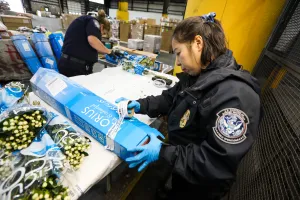Inspections curb unwanted pests, plant diseases from entering U.S.
WASHINGTON – U.S. Customs and Border Protection agriculture specialists across the United States are ramping up efforts to inspect cut flower shipments to prevent bugs and disease from reaching the American public during Mother’s Day this weekend.
Since April 1, CBP agriculture specialists have inspected more than 1 billion stems of cut
flowers from Europe, Asia, Africa and South America, intercepting 1,514 significant pests of varying species. Colombia remains the top shipping country, with more than 650 million flower stems, most being shipped through the Miami International Airport.
“With more than 1.3 billion flowers cleared last year for Mother’s Day;\, CBP agriculture specialists are on track to surpass the number this year,” said Kevin Harringer, Executive Director, CBP Agriculture Programs and Trade Liaison. “Agriculture specialists remain vigilant at the frontlines and are hard at work to ensure these flowers are available for the holiday. So, whether you plan to give a single stem or an entire bouquet for Mother’s Day, rest assured the flowers will be free from invasive pests, and our nation’s agriculture will be protected.”
While it is legal to import flowers from other countries, certain flowers and plant materials commonly found in floral arrangements are restricted because they may carry plant pests and diseases that can cause damage to U.S. agriculture. A single pest could cause millions of dollars of damage to the nation’s crops. The Noctuidae family, or owlet moths, for example, include more than 35,000 known species that are reported to feed on a range of herbs, shrubs, and trees, including crop plants such as bean and corn, according to the U.S. Department of Agriculture’s Animal and Plant Health Inspection Service.
Valentine’s Day, Mother’s Day, and the Easter holiday weekend are traditionally the busiest times of the year for CBP agriculture specialists, with the most popular flowers being roses, mixed bouquets, and chrysanthemums.
CBP recommends that people who wish to import flowers, plant materials, and other agricultural items consult the CBP Information Center on the CBP website or call (877) 227-5511. Travelers should also declare all items acquired abroad to CBP officers to avoid civil or criminal penalties and reduce the risk of introducing pest and disease to the United States. CBP now offers the CBP One mobile app, which allows travelers to request a variety of CBP services, including inspection of agricultural products. The CBP One app can be downloaded for free from the Apple App Store or Google Play.
Click here for b-roll footage of cut flower inspections.


